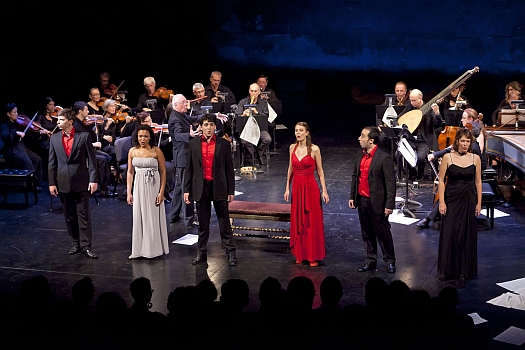 United States Le Jardin de Monsieur Lully: Les Arts Florissants (orchestra), Le Jardin des Voix (vocalists), William Christie (conductor) BAM Harvey Theatre, Brooklyn, NY 25.09.2011 (SSM)
United States Le Jardin de Monsieur Lully: Les Arts Florissants (orchestra), Le Jardin des Voix (vocalists), William Christie (conductor) BAM Harvey Theatre, Brooklyn, NY 25.09.2011 (SSM)
Production (semi-staged)
Directors: Paul Agnew and Sophie Daneman
Cast
Élodie Fonnard, soprano
Rachel Redmond, sorprano
Anna Reinhold, mezzo-soprano
Francisco Fernández-Rueda, high tenor
Reinoud Van Mechelen, high tenor
Callum Thorpe, bass

Lully’s Atys, performed last week at the BAM Opera House, is the epitome of the great French composer’s later stage style, the tragédie en musique. Operas of this type, written in the last 13 years of his life, emphasized drama over music and ballet. (See my review: Atys.) Last night’s performance gave us the opportunity to see and hear works in Lully’s other major styles, where music is the center of attention.
The performance was meant to be a showcase for William Christie’s Le Jardin des Voix, an ongoing master class of young singers trained in early music repertory. Eventually some will go on to join Les Arts Florissants or other early music groups, and it was clear from this performance that these vocalists are already near the top of their profession.
The program opened with excerpts from a very early comédie-ballet: Ballet de la revente des Habits. The symphonie that begins this work is not the “symphony” as we know it today, but “symphony” in the sense of “being in harmony with.” Musically, it just means instruments playing together. This was followed by a delightful recitativo accompagnato sung by Anna Reinhold who also played Cybèle in the acclaimed production of Atys.
The program continued with a group of more substantial musical excerpts, this time from La Grotte de Versailles, a transitional work referred to variously as a comédie-ballet, petit opéra, pastorale or eclogue. The libretto was by Philippe Quinault (the librettist of Atys), and was the first text he wrote for a Lully production. It fails to go beyond the standard themes of love’s torments, the joys of country life versus city life and or the a plaints of shepherd mooning for the unattainable; the shepherds and shepherdesses find happiness in escaping to the fountains and grottes of Versailles. Despite the uninspiring words, all the singers enthusiastically took on their roles, singing the excerpts with a silvery intonation both alone or in unison. The section ended with a popular musical conceit, that of the echo: one voice singing a phrase and the other(s) repeating part or all of it in a softer voice.
Taking a break from Lully, Christie chose several pieces from Michel Lambert for the cast to perform. Lambert, 20 years Lully’s senior, is best known for his plaintive air de cours, songs written with simple accompaniment for one to four voices. Here again, the themes revolve around love and death. Of the four airs performed the most interesting is the round-like “Il faut mourir,” with the recurring quizzical line, “We must not change but die.” Again, the singers performed with appropriate poignancy, bringing back to life a form of music that has been nearly forgotten.
Music from Marc-Antoine Charpentier, whose most vocal advocate is William Christie, was performed next. This pastorale, Il faut rire et chanter, was sung spiritedly by the cast and confirms the notion that where great music is played, text is secondary. Based on the typically clichéd themes mentioned above, most of the text doesn’t rise much above the ditty:
“Sing, sing with us,
He who sings will charm his troubles away
Sing, sing with us,
When you sing your soul is happy
and everything becomes sweet.
Sing, sing with us.”
Yet the music is lovely, rich with both vocal and instrumental complexity that succeeds in spite of the clichéd words.
After the intermission, the group returned to perform more music by Lully. The opening ritournelle from the Ballet de la Raillerie with its repeated phrases could be a chaconne if it weren’t in triple-time. A duet, mocking a very real subject of the day and sung by Rachel Redmond and Anna Reinhold, followed: French vs. Italian music. At the time this music was composed there had been an ongoing debate as to which country’s music was “better” at expressing the most emotion. Italy mocked the music of France for its pathos, tenderness, ornate ornamentation and over-the-top extravagance; France mocked Italian music’s empty virtuosity, unpleasantly high-range vocalism and lack of refinement. Since Lully literally controlled what music could be staged in France and where, this debate would raise its head to become a real issue only after his death.
The excerpts that followed on the program are from the comédie-ballet Le Bourgeois Gentilhomme with a text by Molière, and a selection chosen from the entree “Ballet des Nations.” The music here is exceptional with typical Lully instrumental accompaniment: prominence given to wind instruments with doublings on flutes and oboes (Louis XIV’s favorite instrument). Here castanets were used, rather than Lully’s scored maracas, and the instruments gave a clear Spanish flavor to the music.
Next on the program was the aria “Dormez beaux yeux adorables” from the comédie-ballet Les Amants Maqnifiques a ritournelle sung by the sopranos and almost sounding like a lullaby. Two airs followed from another comédie-ballet Les Plasirs de L’Ile Enchantée, Lully’s first stage production to be done at Versailles. The final work on the program was excerpts from Act III of Lully’s last full production the pastorale-héroique Acis and Galatea. Opening with a captivating instrumental Pasacaille and continuing with charming vocal warmth, the singers completed this magical pastiche with exceptional finesse. My only caveat is that I wish the cast of singers had not been directed to dance in Baroque style, even if it was generic movements and gestures. But this was a slight bit of amateurish staging in an otherwise totally professional and exhilarating production.
Stan Metzger
